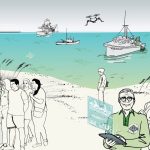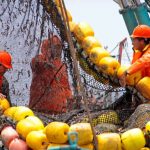A new report by Seas At Risk highlights a number of ways that fisheries across Europe can reduce their greenhouse gas emissions while simultaneously reducing their damaging impact on the marine environment.
The report – titled ‘Moving Towards Low Impact Fisheries in Europe: Policy Hurdles & Actions’, undertaken by the independent fisheries consultancy MacAlister Elliott and Partners – finds that through changing the type of fishing gear, the fishing industry can decrease the damage it inflicts on marine ecosystems, reduce its greenhouse gas emissions and lower its fuel costs.
Coinciding with World Oceans Day and European Fish Week, the study also identifies reasons as to why fishermen are not shifting gears even with high energy prices on the horizon – reasons that include a lack of knowledge and inflexible EU fisheries management.
Monica Verbeek, Executive Director of Seas At Risk, said: “This comprehensive report shows both fishers and the environment will benefit from a shift to low impact fisheries. The 2012 reform of the Common Fisheries Policy provides a unique opportunity to adopt well designed policy measures to promote such a shift.”
The report makes the following key points:
• Heavy trawls and dredges that scrape over or dig into the bottom have most impact on the environment, both in terms of habitat destruction and selectivity and in terms of carbon emissions. Less impacting alternative gears include traps and lines.
• Although data on carbon emissions are not straightforward, in general, demersal trawl fisheries and offshore longline fisheries perform badly in terms of carbon emissions per unit catch, passive gears like nets and traps perform better than towed gears, and small vessels perform better than medium sized and large vessels.
• Where fish stocks are depleted and poorly managed, fisheries have bigger negative impacts than those fisheries on well-managed stocks.
• Common problems fishermen face when trying to switch to less damaging fishing techniques include costs, a lack of knowledge on best practices, gear conflicts (passive gear cannot be used where a large number of towed gears are in operation), and practicalities (less harmful gear can be more difficult to use than harmful gear).
• Policy can also acts as a hurdle to a shift to more sustainable fisheries. Currently, the most serious policy hurdle to low impact fisheries is the inflexible nature of the EU fisheries management system. The current short-term micro-management system based on TACs, quotas and effort should therefore be replaced by a more flexible and long-term management system, which supports low impact fisheries.
Based on this report, Seas At Risk calls for the reformed Common Fisheries Policy to promote a shift to low impact fisheries through:
• Preferential access to fish resources for low impact fisheries;
• Elimination of overcapacity using environmental and social criteria, ensuring that the most sustainable vessels remain in the fleet;
• Phase-out of fuel tax exemptions and other perverse subsidies;
• Redirection of subsidies to training/education programs promoting low impact fisheries;
• Introduction and promotion of spatial planning, with zones set aside for low impact fisheries, especially those using passive gears.
A selection of the report’s findings can also be viewed in the accompanying brochure.








